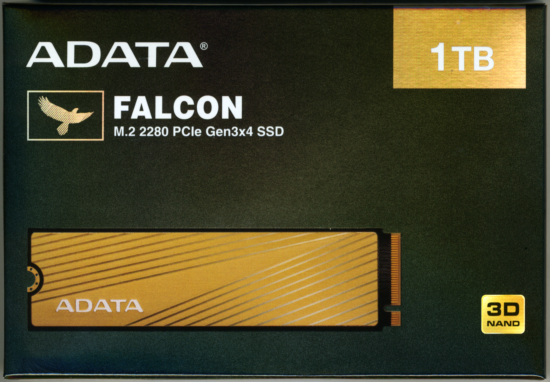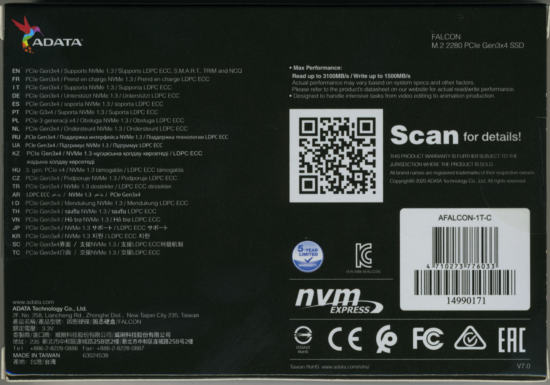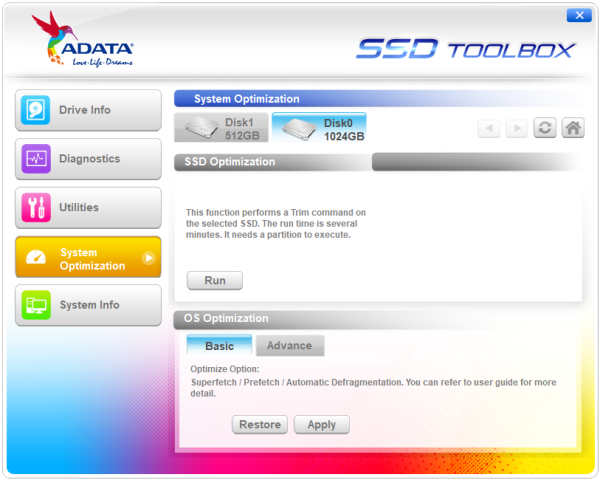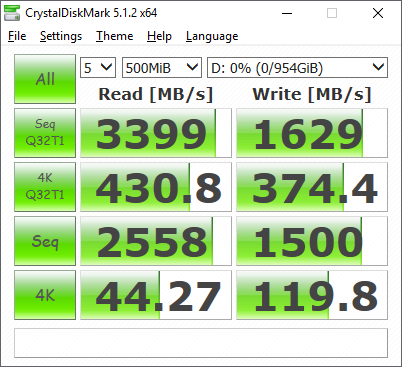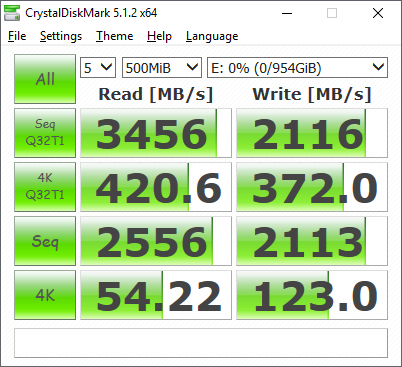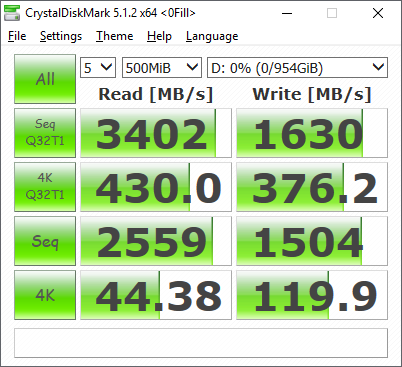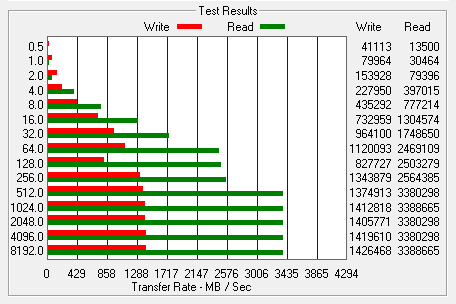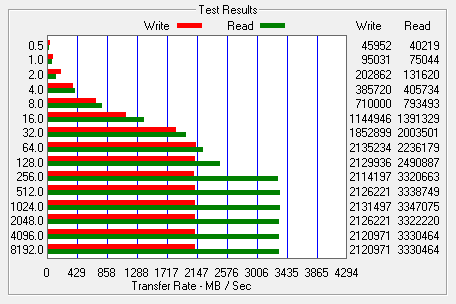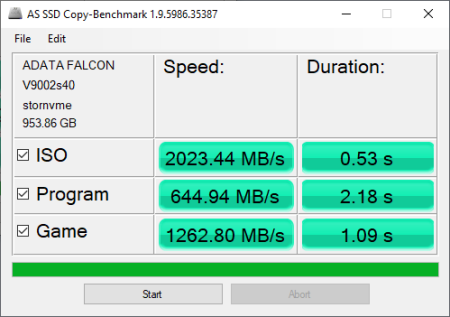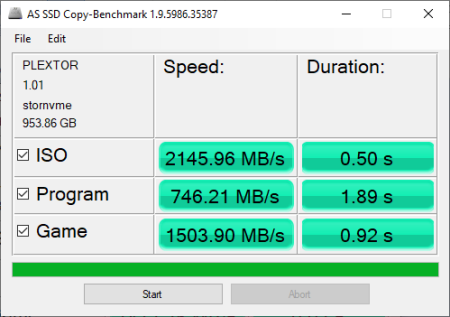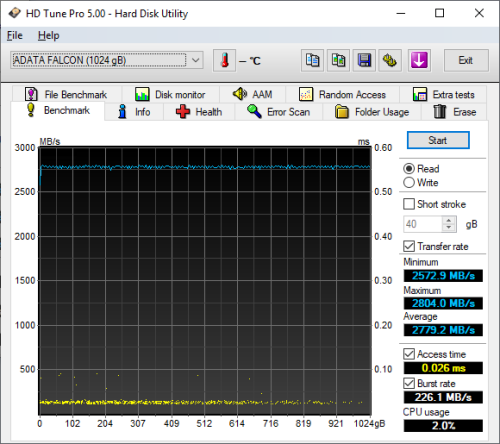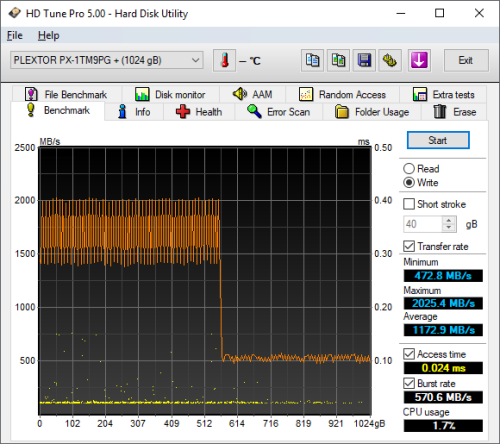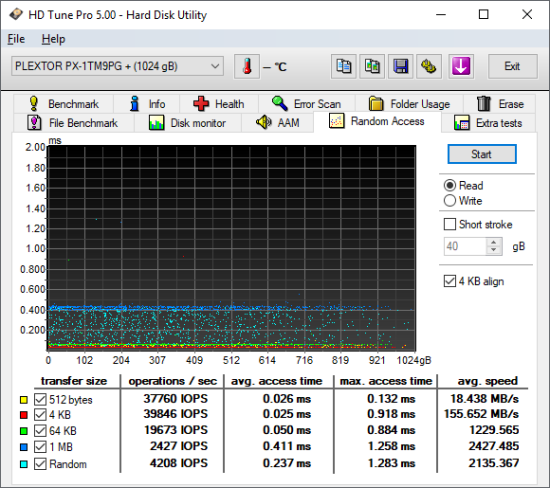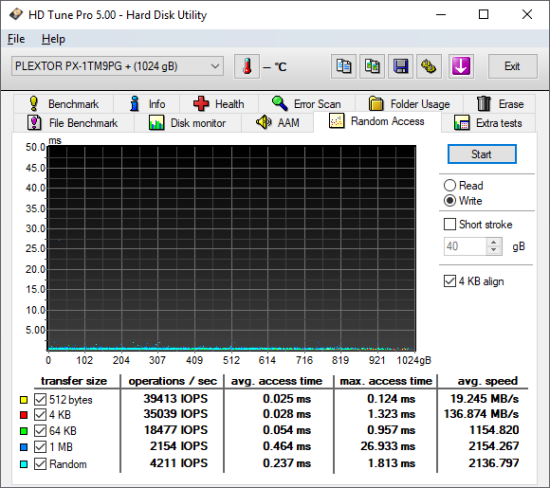

Model: ADATA FALCON 1TB PCIe M.2 Solid State Drive
Manufacturer: ADATA Technology
Provided By: ADATA Technology (USA)
ADATA Technology is one of the world's leading manufacturers of high performance memory modules and data storage solutions. Founded in 2001 with a staff of 20, this Taiwanese company set itself apart from the competition early on thanks to its professionalism, industry know-how and eye-catching product designs. Today, ADATA continues to lead the way through constant innovation and development of products that exceed customer expectations. Backed by technical expertise, state-of-the-art manufacturing facilities and premium customer service, ADATA currently offers a variety of products including DRAM modules, USB flash drives, memory cards, solid state drives and portable hard drives.
One of the latest additions to ADATA's line of solid state drives is the FALCON. Designed with creators in mind, this heatsink-equipped, M.2 form factor drive is powered by Realtek's RTS5762DL controller and is available with up to 2TB of 3D TLC NAND flash. The FALCON also utilizes HMB (Host Memory Buffer) and intelligent SLC caching to accelerate read and write speeds along with LDPC (Low-Density Parity-Check) error correcting code technology to ensure data integrity and extend the lifespan of the drive. To top it all off, the FALCON is equipped with an ultra-fast PCIe Gen3 x4 NVMe 1.3 interface and is capable of 3,100 MB/s read and 1,500 MB/s write speeds.
The FALCON is available in 256GB, 512GB, 1TB and 2TB capacities. For this review, ADATA sent us the 1TB version of the drive which is capable of delivering up to 3,100 MB/s sequential read and 1,500 MB/s sequential write speeds as well as up to 180,000 random read and write IOPS.
| ADATA FALCON 1TB PCIe M.2 Solid State Drive | |||||||||||||||||||||||||||||||||||
General Specifications
Performance
Reliability
Environmental
Dimensions and Weight
Other Features
|
Needless to say, this is only a taste of what the FALCON has to offer. To give you an idea of what to expect, we'll take a closer look at ADATA's new PCIe SSD and then see how well it performs. Does the FALCON have what it takes? Can it deliver the value and performance we've come to expect from ADATA? Keep reading as we find out.
The FALCON comes in a small black box. Along with a picture of the drive, the front advertises a number of its key features including its 1TB capacity, PCIe Gen3x4 interface and 3D NAND. The back of the box provides a bit more information regarding the FALCON's features and performance.
Physical Features:
The FALCON uses the 2280 form factor for M.2 (NGFF) SSDs. It measures 22 x 80 x 2.9 mm and tips the scales at a mere 9g. The drive also has an "M key" edge connector which provides PCIe SSDs with up to 4x lanes of bandwidth.
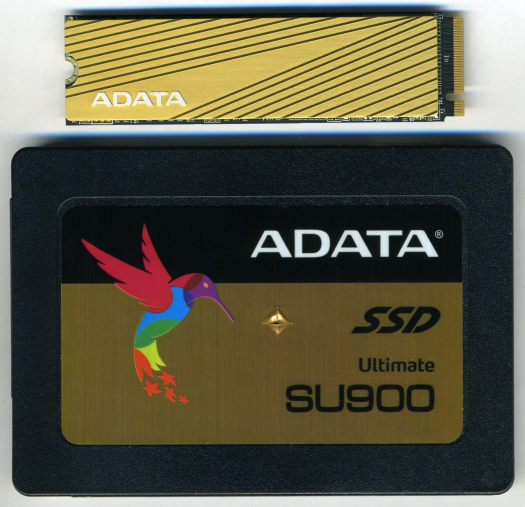
The FALCON uses Realtek's RTS5762DL controller. This DRAM-less, PCIe Gen 3 x4 controller supports eight channels with up to four chip enables (CE) per channel. The RTS5762DL is also compatible with 3D TLC/QLC NAND flash and offers features like AES 256-bit encryption, advanced low-density parity check (LDPC) technology and end-to-end data path protection.


For the 1TB version of the FALCON, ADATA has opted to use their own 3D TLC NAND flash. If you'd remove the heatsink, you'd see that there are four 256GB NAND flash packages on top of the PCB. There is also no DRAM cache chip as the FALCON's RTS5763DL controller takes full advantage of NVMe's Host Memory Buffer feature by using a small portion of the computer's memory to cache the mapping tables.
Like ADATA's other SSDs, the FALCON works with their SSD Toolbox. This free downloadable utility is an easy way for users to obtain information about their drives and change various system settings. Additionally, it can be used to speed up your SSD and even improve the endurance of a drive.
When you run ADATA SSD Toolbox, the main screen displays information about your drives. From here, users can view information like the capacity, used space, temperature, health and lifespan of each drive. By clicking on the tabs, you'll also find information like the model name, firmware version and serial number and connection speed.
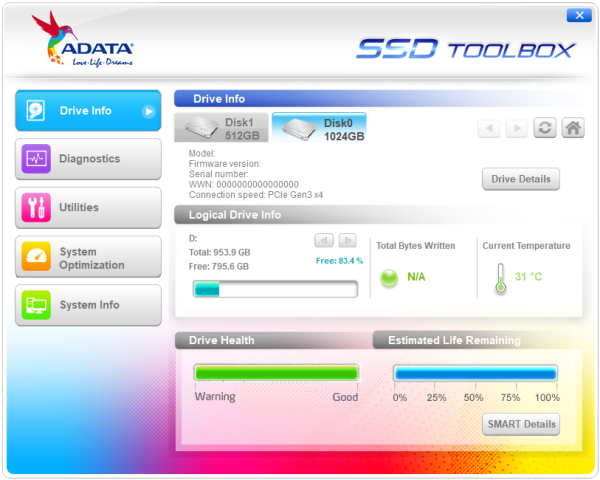
The SSD Toolbox offers two different diagnostic scans. The quick diagnostics scan runs a basic test on free space and is usually completed in under two minutes. The full diagnostics scan runs a read test on all used space and a write test on all free space of the selected drive. Needless to say, the full scan takes much longer to complete.

ADATA's SSD Toolbox also includes a number of utilities. Along with the ability to do a secure erase, users can update a drive's firmware, upgrade the software and export a log file containing information about your system and drives.
The System Optimization option gives users the ability to run a TRIM command on a selected SSD. Users also have the ability optimize their OS by enabling features like superfetch, prefetch and automatic defragmentation.
SSD Toolbox can also be used to view information about your system. The utility displays a number of things including the operating system, CPU, amount of usable RAM and the model and BIOS version of your motherboard.
The test system used in this review is equipped with an Intel Core i7-6700K CPU, GIGABYTE GA-Z170X-UD3 motherboard, 32GB (16GB x 2) of Crucial Ballistix Sport LT DDR4 memory, Samsung 960 PRO 512GB SSD and a GIGABYTE GeForce GTX 1060 WINDFORCE OC 6G graphics card. For the operating system, I installed a fresh copy of Windows 10 Enterprise.
To test the performance of ADATA's FALCON SSD, I ran a series of benchmarks using CrystalDiskMark, HD Tach RW, ATTO Disk Benchmark, AS SSD, HD Tune Pro, Anvil's Storage Utilities, Iometer and PCMark 8. For comparison, I've also included test results from the Lexar NM610, Silicon Power P34A60, Patriot P300, Plextor M9PG Plus, Plextor M9PY Plus, ADATA XPG SX6000 Pro, Western Digital WD Black SN750, Samsung 970 EVO Plus, ADATA XPG SX8200 Pro, Crucial P1, ADATA XPG SX8200, Western Digital WD Black NVMe, Samsung 970 EVO, Samsung 970 PRO, Plextor M9Pe, Plextor M8Se, Patriot Hellfire, ADATA XPG SX8000, Samsung 960 PRO, Toshiba OCZ RD400, Samsung 950 PRO, Samsung 860 QVO, Samsung 860 PRO, Crucial MX500, Plextor M8V, Samsung T5, Crucial BX300, ADATA Ultimate SU900, Plextor S3C, Toshiba OCZ VX500 and ADATA Ultimate SU800.
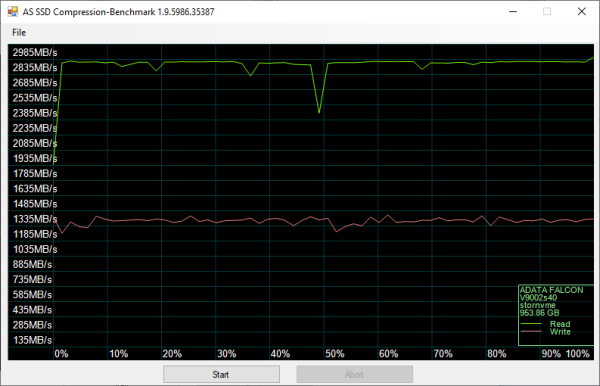
As I mentioned earlier, the FALCON is based on Realtek's RTS5762DL controller chip. Looking at the screenshot above, you can see that it performs equally well with both incompressible (0%) and compressible (100%) data.
CrystalDiskMark 5.1.2:
First, I ran a few quick tests using CrystalDiskMark. This benchmark tool measures the performance of a storage device by testing its sequential read and write speeds as well as its random read and write speeds using blocks 512K and 4K in size.
According to ADATA, the 1TB version of the FALCON is capable of reading at 3,100 MB/s and writing at 1,500 MB/s. Looking at the screenshot above, you can see that the drive had no problems reaching these speeds in CrystalDiskMark's sequential read and write tests.
The FALCON performed equally well when using highly compressible 0x00 (0 Fill) data. This time around, the drive was able to read at 3,402 MB/s and write at 1,630 MB/s.
HD Tach RW 3.0.4.0:
Next, I used HD Tach to test the FALCON's read, write and burst speeds as well as its seek times and CPU usage.
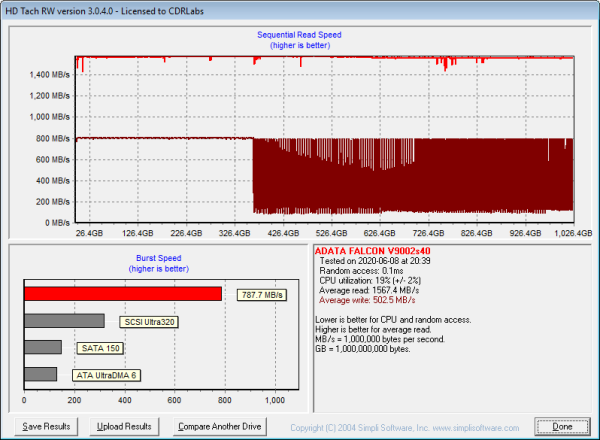
Looking at the screenshot above, you can see that the FALCON had average read and write speeds of 1,567.2 MB/s and 502.5 MB/s, respectively, as well as a burst speed of 787.7 MB/s. The screenshot also shows that, like most other TLC-based SSDs, the FALCON uses some sort of SLC caching. The drive starts writing at about 800 MB/s and then drops to about 175 MB/s when the write operation exceeds the size of the cache.
ATTO Disk Benchmark 2.46:
I also used ATTO Disk Benchmark to test the FALCON's sequential read and write speeds. The tests are run using blocks ranging in size from 0.5KB to 8192KB and the total length set to 256MB.
When tested with ATTO, the FALCON's read speeds topped out at about 3,388 MB/s and its write speeds at 1,426 MB/s.
AS SSD:
AS SSD is a benchmark designed specifically for solid state drives. The application contains five synthetic tests used to determine the sequential and random read and write performance of a drive.
AS SSD also includes a copy benchmark. This test copies an ISO (two large files), program (many small files) and game (small and large files), returning the speed and duration of each.
HD Tune Pro 5.00:
Next, I ran a series of tests using HD Tune Pro. This hard disk utility measures a drive's performance by testing its sequential read and write speeds as well as its access time, burst rate and CPU usage. For this review, I'm also going to use it to benchmark the FALCON's random read and write speeds, random access times and the number of operations per second.
The FALCON performed relatively well when benchmarked with HD Tune. The drive had average read and write speeds of 2779.2 MB/s and 920.8 MB/s, respectively.
When reading 4KB blocks, the FALCON reached 36,979 IOPS and had an average speed of 144.451 MB/s. The drive was even faster when writing, reaching 38,848 IOPS with an average speed of 151.752 MB/s.
Anvil's Storage Utilities:
Anvil's Storage Utilities is another benchmark designed with SSDs in mind. The standard storage benchmark measures a drive's performance by testing its transfer speeds, access times and IOPS.
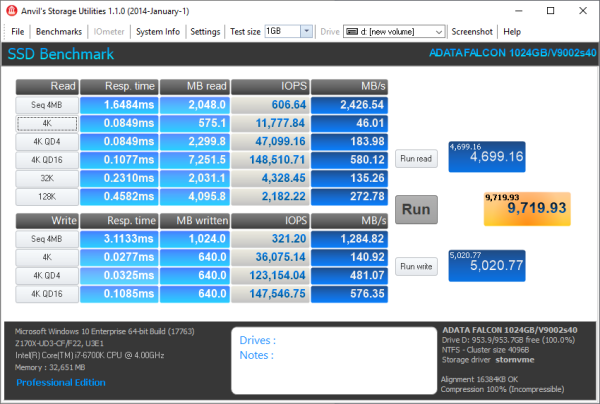
Iometer:
Lastly, I ran a series of tests using Iometer. This tool can be configured to benchmark a number of things. In this case, I used it to measure the FALCON's read and write speeds and the number of operations per second. The tests were run using random bytes and a queue depth of 3.
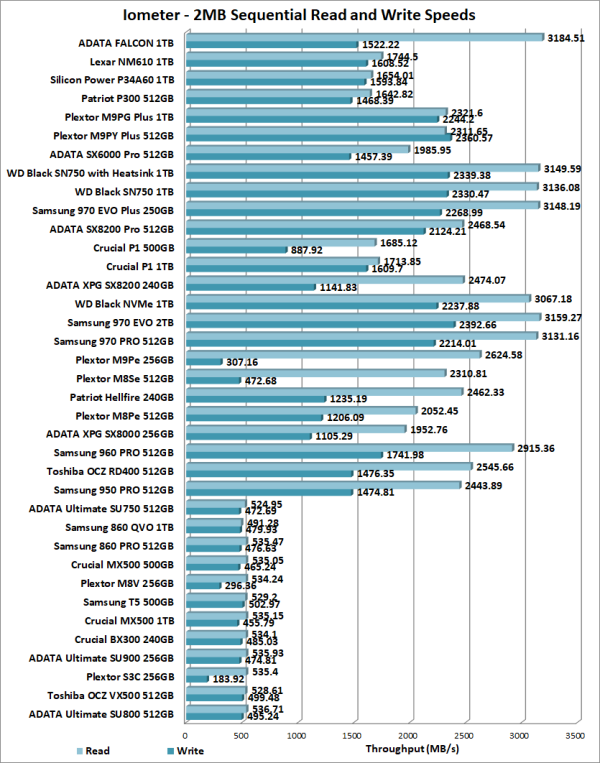
The FALCON's performance here was similar to what we saw in our other tests. The drive was able to read at 3184.51 MB/s and write at 1522.22 MB/s.
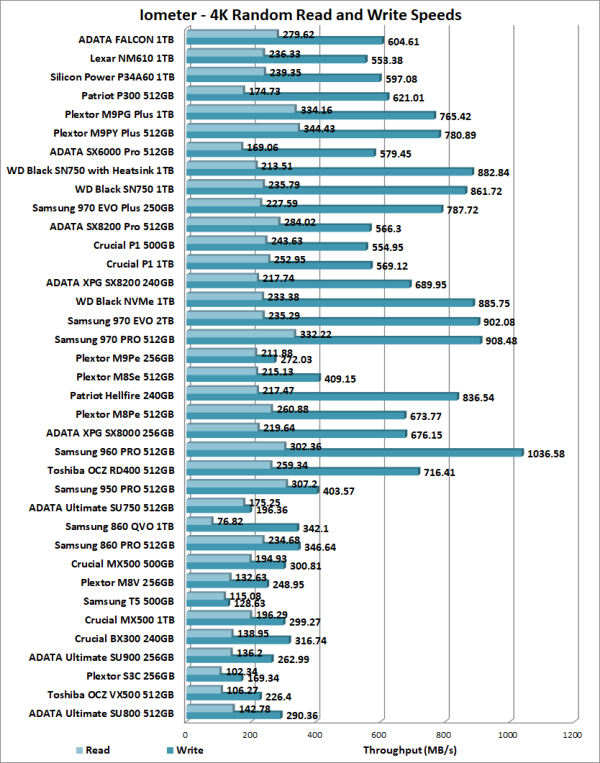
The FALCON also performed fairly well when doing random reads and writes. In our tests, the drive was able to read at 279.62 MB/s and write at 604.61 MB/s.
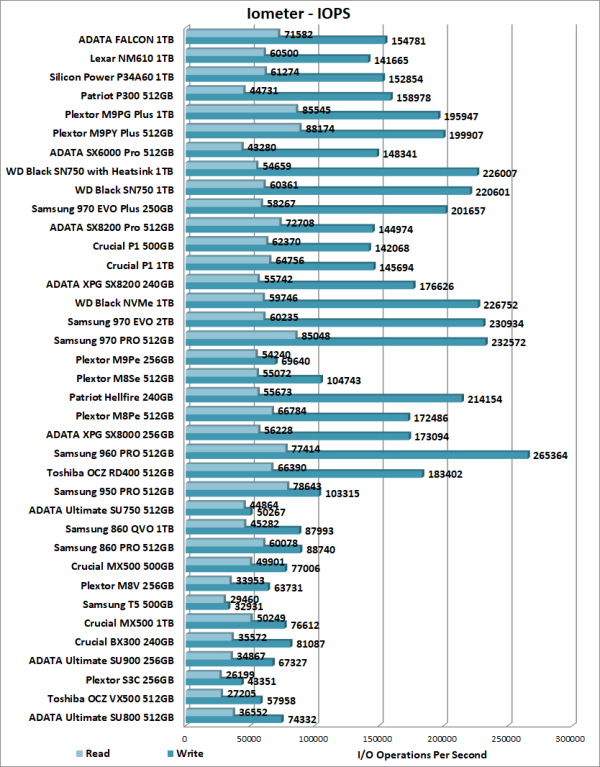
According to ADATA, the 1TB FALCON is capable of 180,000 IOPS when both reading and writing 4K blocks. In our tests, the drive reached 71,582 random read IOPS and 154,781 random write IOPS. As with most drives, the FALCON performed better at higher queue depths. With four threads and the queue depth set to 32, it reached 234,517 random read IOPS and 194,180 random write IOPS.
PCMark 8 - Storage Test:
PCMark 8 is a complete benchmark for Windows. It includes five benchmark tests, each designed around a specific scenario. The storage benchmark measures drive performance using real-world traces recorded from Adobe Creative Suite, Microsoft Office and a selection of popular games.
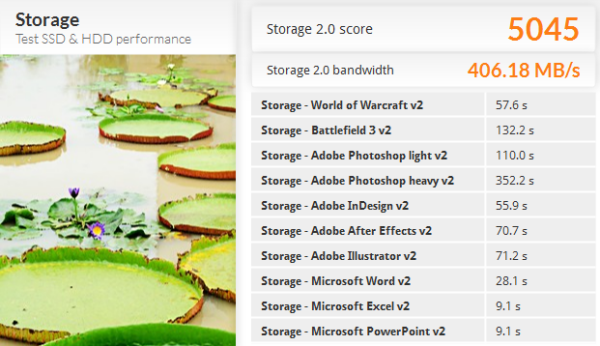
PCMark 8 also includes a consistency test which measures the performance consistency and degradation tendency of a storage system. The test reports the performance level at the start, the degraded steady-state and the recovered state as well as the number of iterations required to reach the degraded state and the recovered state. For this test, we are focusing on the Adobe Photoshop (Heavy) trace and will look at both the bandwidth and latency of the drive
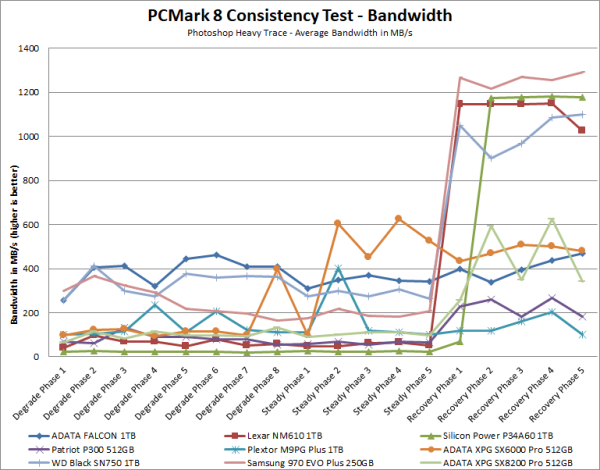
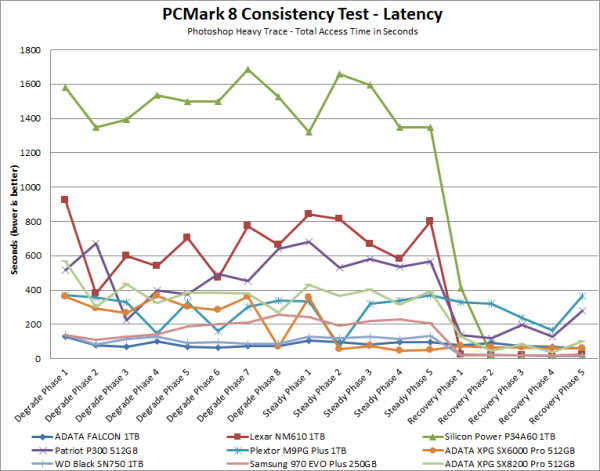
The FALCON's performance was hit and miss in this test. While the drive was relatively quick during the degradation and steady phases, its performance never really recovered. The FALCON lagged well behind the drives from Samsung, Lexar, Silicon Power and Western Digital during the recovery phases, topping out at only 470 MB/s.
TRIM Performance:
While SSD's offer many benefits, there are some downsides to using flash memory. One of the biggest issues people run into is performance degradation. Over time, an SSD will run out of fresh blocks and will have to write over data the file system has marked as deleted. This procedure is very complicated and can slow an SSD's write speeds considerably.
To fix this problem, most manufacturers have added TRIM support to their SSDs. The TRIM command allows an operating system, such as Windows 10, to tell an SSD which data blocks are no longer in use. Using this information, the drive pro-actively erases these blocks and adds them to the free block pool.
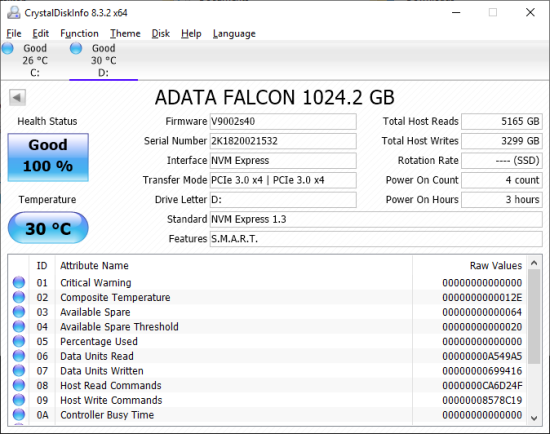
To test the FALCON's TRIM and garbage collection functions, I first put the drive in a "dirty" state. I used Iometer to fill 80% of the drive and then ran a random write test for 30 minutes. Looking at the screenshot below, you can see that the FALCON's average read and write speeds dropped to 1775.84 MB/s and 30.42 MB/s, respectively.
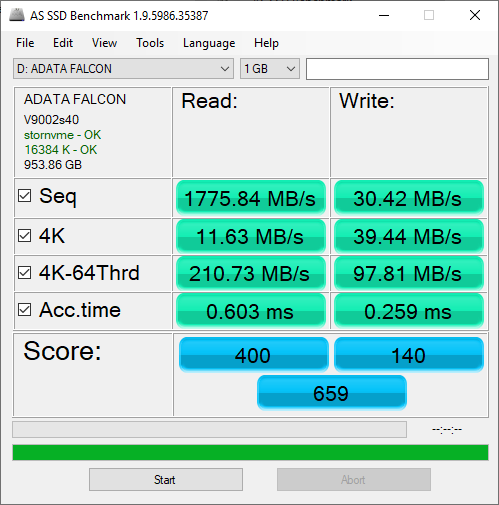
ADATA FALCON - Dirty
To see how well the FALCON could recover, I let the computer sit for about 30 minutes and then reran the test. The drive wasn't able to reach the factory fresh performance shown in our earlier tests. However, its sequential write speed jumped up to 832.79 MB/s.
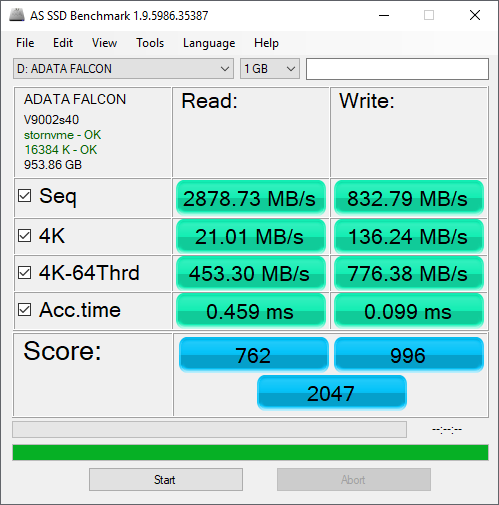
ADATA FALCON - After TRIM
Lastly, I used Parted Magic to perform a secure erase on the FALCON. With the drive wiped clean, it had average read and write speeds of 2913.19 MB/s and 1267.66 MB/s, respectively.
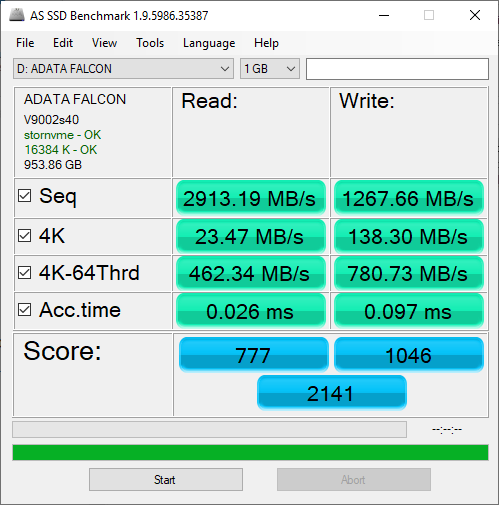
ADATA FALCON - Secure Erased
Heatsink Performance:
While faster than their SATA-based SSDs, PCIe drives like the FALCON tend to generate more heat. In fact, if your computer doesn't have enough airflow or a large video card covering your M.2 slots, they can get quite hot. To prevent themselves from overheating, most SSDs have implemented a mechanism called thermal throttling which automatically reduces a drive's performance when it reaches a certain temperature.
If you're someone looking to get the most out of your SSD, this is something that you don't want to happen so companies like ADATA have begun to include an optional, stick-on heatsink with many of their PCIe SSDs. In the case of the FALCON, its aluminum alloy heatsink comes pre-installed.
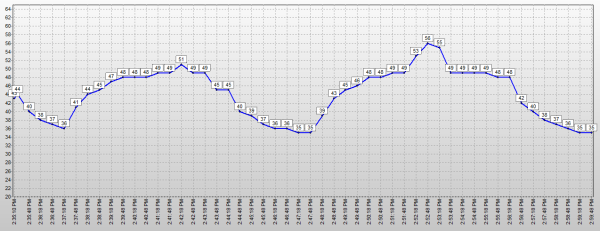
The FALCON's heatsink did a great job of keeping it cool. At idle, temperatures hovered around 35 ºC. During our tests, the drive's temperature ranged between 50 ºC and 60 ºC and even hit 70 ºC at one point with no sign of thermal throttling.
Final Thoughts:
The ADATA FALCON is an excellent choice for the creative professional looking for a fast, yet affordable, PCIe SSD for their notebook or desktop computer. This heatsink-equipped, M.2 form factor SSD is powered by Realtek's RTS5762DL controller and is available with up to 2TB of 3D TLC NAND flash. Combine this with a PCIe Gen3 x4 NVMe 1.3 interface and you have a drive capable of delivering nearly six times the performance of your average SATA 6Gb/s SSD. In our sequential read and write tests, the 1TB version of the FALCON was able to read at speeds as high as 3,402 MB/s and write at speeds in excess of 1,629 MB/s. It also did relatively well in our random write tests, producing more than 154,000 IOPS at low queue depths.
Of course, fast read and write speeds aren't the only things the FALCON has to offer. In addition to a good looking, aluminum alloy heatsink, the drive features intelligent SLC caching, Host Memory Buffer (HMB) and advanced LDPC error correcting code technology. To top it all off, the FALCON supports AES 256-bit encryption and is backed by a 5 year warranty.
The FALCON is available now in 256GB, 512GB, 1TB and 2TB capacities. Prices on Amazon.com currently range from $55 up to $240, with the 1TB version reviewed here retailing for about $130.

Highs:
- Available in 256GB, 512GB, 1TB and 2TB capacities
- PCIe 3.0 x4 interface with NVMe protocol
- Realtek RTS5762DL controller
- Equipped with 3D TLC NAND
- Excellent sequential read speeds
- Good random read and write performance
- Small M.2 2280 form factor
- Intelligent SLC caching
- Advanced hardware LDPC ECC technology
- Host Memory Buffer (HMB)
- Aluminum alloy heatsink
- AES 256-bit encryption
- Works with ADATA's SSD Toolbox software
- Reasonably priced
- 5 year warranty
Lows:
- Write speed drops considerably when SLC cache is full
